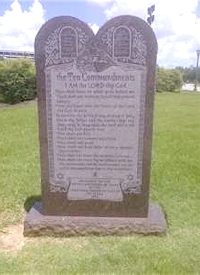
The anti-religion enforcers of the ACLU and Freedom From Religion Foundation (FFRF) are out in force once again, sniffing for any sign of faith, worship, or Christian symbols at schools, court houses, or any other public venue.
On February 8 the ACLU’s New Mexico franchise filed suit against the community of Bloomfield over its display of a Ten Commandments monument on the city hall lawn. The lawsuit, supposedly filed on behalf of two local residents upset by the low-key display, “alleges that the monument is a government endorsement of religion and violates the First Amendment to the U.S. Constitution as well as the New Mexico State Constitution,” the ACLU explained in its promotional materials on the case.
According to the Farmington, New Mexico, Daily Times, local secular activists sought to make the monument a divisive issue from the moment it was proposed back in 2007. Nevertheless, despite objections from some citizens and a petition drive against the monument, the Bloomfield city council approved a resolution for the display to be privately funded and erected on city property. The Ten Commandments monument was installed on July 4, 2011.
In the suit, the two aggrieved residents complain that the monument “represents only one religious point of view and therefore sends a message of exclusion to those who do not adhere to that particular religion.” Additionally, ignoring the origins of the Ten Commandments within Judaism, they argue that the monument somehow demonstrates that “the city favors the Christian religion and supports Christianity over other religions.”
The state’s ACLU director, Peter Simonson, added a subtle manipulation to the issue, declaring that “individuals, religious communities, and religious associations should be free to post the Ten Commandments as they wish, and the ACLU will defend their right to do so. But the government should not decide which religious doctrines it favors and then post them on government property. Government should stay out of the business of religion and avoid choosing some religious beliefs over others.”
ACLU attorney Laura Schauer Ives insisted that by allowing the privately funded display, “Bloomfield has concluded that the Protestant version of the Ten Commandments is superior to the Catholic and Jewish versions” — although the variations are mainly in how the commandments are grouped and enumerated by the respective religions, while remaining substantially the same. She argued, nonetheless, that government — be it local, state, or federal — “shouldn’t put itself in the position of having to discriminate in that way. By staying out of matters of faith, government gives all religions an equal chance to thrive in our country.” She declared, outlandishly, that such “was the purpose of the religious liberty clauses in the First Amendment.”
In a similarly nuanced effort, the FFRF is threatening the community of Newland, North Carolina, over a Ten Commandments plaque that graces the entrance to its town hall. In a terse epistle to Newland’s town manager, Brenda Pittman, FFRF attorney Patrick Elliott wrote that his client in the case had been confronted one day by the “unconstitutional display” while doing business at the town hall.
Claiming that the display is a blatant violation of the First Amendment’s establishment clause, Elliott harangued Pittman: “Residents in your community are offended by the display.” Brushing aside the overwhelming support the display has had from local residents who appreciate its inspiring intent, Elliott declared: “It makes no difference how many residents of Newland might want the town to display religious edicts; the Ten Commandments plaque is unconstitutional and must be removed.”
Town officials said that while they have received many calls and responses of support for the display, fighting the FFRF and its perpetual intrusion will be a drawn-out and costly affair. “Can we see this being a potential long term issue?” reflected alderman Dave Calvert to television station WSOC. “Yes. Is it going to be a fight and is there going to be cost? Certainly. We’ll see how the public responds to that.”
Calvert, who supports the display and is inclined to fight the atheist attack, noted that the Ten Commandments “are more than Mosaic Law; they are moral guidelines of what is right and wrong. As you take these out of our society, you take [away] our ability to raise our children right. Not upon faith, but what is right and wrong.”
Popular North Carolina Republican congressional candidate Ethan Wingfield used the conflict to highlight his own conservative Christian convictions. “The Ten Commandments are the governing principles and foundation of our most basic laws and rights,” he declared in a statement. “I believe there is no better place to display this sacred document than in a city hall or a courthouse.” Playing off the rage local residents and public officials feel for what they see as intrusion by the Wisconsin-based FFRF in their local affairs, Wingfield said: “Why should we disregard the wishes of the citizens of Newland in order to appease an atheist special-interest group based hundreds of miles away in another state?”
Former Alabama Supreme Court Chief Justice Roy Moore, who lost that position in 2003 for refusing a court order to remove a Ten Commandments monument from Alabama’s judicial building, has been a chief advocate for municipalities battling the ACLU and FFRF over such displays. “The Ten Commandments are the moral foundation of our law,” he observed, “and the First Amendment lays out our religious liberties under the Constitution — and neither has been altered since they were first enacted.”
Concerning court verdicts that have gone against Ten Commandment displays, he added: “If usurping federal judges continue to hold that God’s law violates the Establishment Clause, then it is those judges that need to be removed, not the Ten Commandments.”

